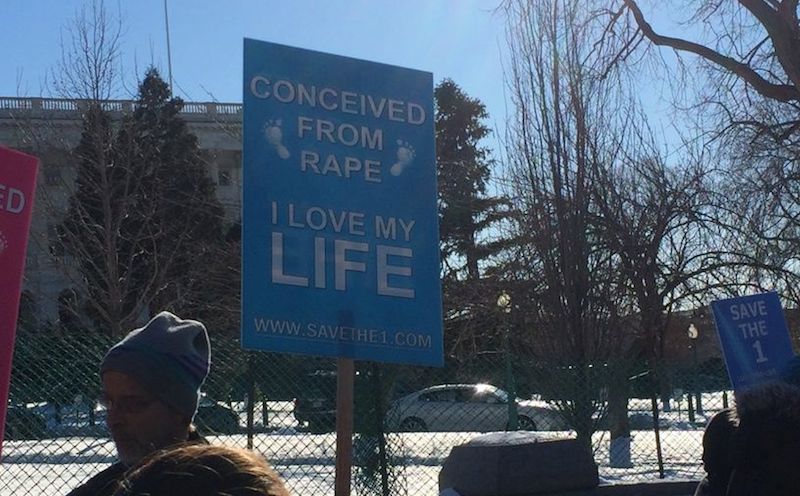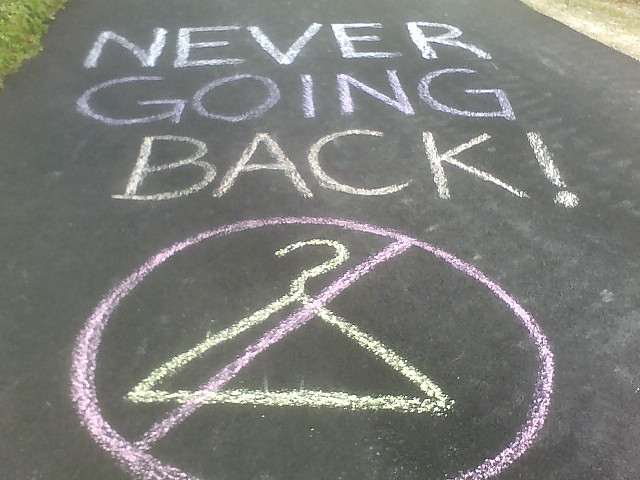Students sign petition to legalize FOURTH trimester abortion…
It’s tragic to see that there’s no thought involved here…
"We are travellers…not yet in our native land" – St. Augustine
It’s tragic to see that there’s no thought involved here…

Today marks the final most in my series of articles to mark the March For Life. I’d like to end with a post concerning one of the toughest situations concerning abortion: pregnancies which are brought about by rape or incest. Such cases, according to Planned Parenthood accounts for less than 1% of abortions. Today I would like to explain in humility how I try to respond when this difficult issue is raised.
It is not unusual to find people who are against abortion, but who grant an exception for these “hard cases”. For example, I have heard the following:
“Don’t misunderstand me, I think abortion is wrong, but I can’t say I’m fully pro-life. I think that if a girl gets raped and finds herself pregnant, she should be able to get an abortion, otherwise she’d have a constant reminder of what happened to her for the next nine months. It just seems cruel to force her to go through with the pregnancy. Would you really expect her to raise the child of her rapist?”
How might you respond to this understandably emotionally-charged objection?
When pro-life advocates respond to pro-choice objections, there is a great emphasis on logical consistency and reasoning. However, particularly when the subject of rape is raised, this can have the unintended consequence of making the pro-lifer appear unfeeling and clinical.
Therefore, throughout the abortion debate, but especially when the subject of rape is raised, I think it’s important to communicate a genuine compassion and empathy prior to offering the logical rebuttal. We need to show that we understand the tremendous trauma of such an event and the great burden which has now been placed on the woman without her consent.
When someone tells me that he thinks abortion is wrong except in the case of rape, I usually postpone discussing the question of rape and instead first spend a little bit of time asking that person why he is generally against abortion.
The person will usually explain that he recognizes that the unborn are defenseless human beings who therefore should not be killed. If that is the case, I will ask if any of this changes as a result of the circumstances of the conception. Is the unborn child any less defenseless? Is the unborn child any less human?
The truth is that the child conceived in rape is just as valuable as the child conceived in love. Here is a one of many signs I saw at March For Life last year:
 The woman holding this sign was not responsible for the circumstances of her conception.
The woman holding this sign was not responsible for the circumstances of her conception.
I think it’s also important to take a step back and ask ourselves why rape is such a terrible crime. It’s awful because an innocent person has her body violated in an act of violence by a stronger aggressor. Given this description, is abortion really that different? The act of rape made one victim, but abortion makes another, compounding the first act of violence with another.
If a rapist is brought to justice, he will not receive the death penalty for his horrendous felony. Does it seem reasonable that the child, who has committed no crime and never asked to be conceived, to receive a punishment which even the rapist would not receive?

For today’s entry in this series, I would like to address another comment which appeared on Facebook last year in response to my presence at the March For Life in Washington DC. One of my former work colleagues wrote the following:
“Pro life has to do with wanting people to live lives, including unborn children. But is the quality of life for both child and mother taken into consideration, or is it only about “saving” the life of the child?”
The question concerning quality of life is often raised in the abortion debate. The motivation behind it is good – we don’t want people to suffer, we want them to live the happiest lives possible.
Since yesterday was the anniversary of the infamous Roe Vs. Wade decision, here are some things you might not know about it:
1. “Jane Roe” of Roe v Wade is now pro-life
2. Roe and Doe permit abortions up to birth
3. Contrary to Roe, there is no fundamental “right” to an abortion in the Constitution
4. Support for abortion before Roe was decided was fabricated
5. After Roe, abortions peaked
For more details for each of these points, please click on the image below:

Have you ever been speaking about abortion and heard someone who’s pro-choice exasperatingly exclaim “Stop imposing your religion on me!”? Well, today’s entry in this abortion series addresses that very issue…
Last year, I posted on Facebook that I was at the March For Life in Washington DC. This raised the interest of some of my pro-choice friends, so I explained to them why I’m against abortion and why I’m pro-life.
In response to my explanation, I was told again and again that Christians should stop imposing their religion on others. I found the objection rather odd. Why? Well, I found it strange because I hadn’t mentioned religion once in any of my arguments. Neither had any of my friends when they contributed to the thread. All the arguments against abortion which were presented did not rely at all on a theistic worldview.

Interestingly, the people who first brought religion into our discussion were those who were pro-choice. Again and again they returned to the idea that we were arguing against abortion on religious grounds. However, we never mentioned God, nor did we cite any religious text or authority. Funnily enough, something very similar happened on Brandon Vogt’s blog around the same time…
Unfortunately, rather than responding to our (non-theistic) arguments, some retorted with cheap shots against the Christian faith. Not only that, we were repeatedly treated to my own personal pet peeve, the armchair interpretation of Bible by non-Christians, which naturally included the classic misinterpretation of “Judge not lest you be judged”.
I’ve said many times bore that, even if I were not a Christian, I’d still be pro-life. The arguments against abortion don’t require a belief in God. The pro-life arguments are scientifically, philosophically and psychologically robust. If I were an atheist I might perhaps have some difficulty explaining why human life has intrinsic value, but it’s an instinct that I don’t think I could deny, even if I wanted to.

Today I would like to continue this pro-life blog series by briefly responding to something which is regularly brought up during discussions on abortion.
I have often heard it said, even by people who think that abortion is terrible and wrong, that they would prefer to see abortion remain legal for fear that, if it were made illegal, it would just drive the abortion industry underground:
“I think abortion is wrong, but I think it’s much better to keep it legal so that we can make it as safe as possible”
On the Internet, this is often expressed in images such as this:

Of course, whenever a person says he doesn’t like abortion but still wants to keep it legal, a really good starting place to begin the discussion is to ask him first why he don’t like abortion… But does the logic presented here stand up to scrutiny? Is it better for abortion to be legal and regulated?

Those who are pro-choice will often chastise those who are pro-life for “judging women who have abortions” and “failing to love them”. Today I’d like to look at the substance of these charges. Is that true? Is it unloving to speak out against abortion?